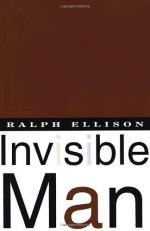|
|
Invisible Man Author/Context
Ralph Ellison was born in Oklahoma City, Oklahoma in 1914 and was raised in an environment that encouraged self-fulfillment. Ellison went to Tuskegee Institute from 1933 to 1936 where he was trained as a musician. In 1936 Ellison visited New York and met author Richard Wright. This interaction led to his first attempts at fiction. Invisible Man (1952), his first novel that began as a war novel and made the transition to a novel questioning racial identity, was met with accolades. Invisible Man won the National Book Award and the Russwurm Award. Ellison also published reviews, short stories, articles, and criticism that appeared in many national magazines and anthologies.
In addition to his writing career, Ellison has also been a fellow of the American Academy in Rome from 1955 to 1957 in addition to teaching at Bard College. Following that, in 1961 Ellison served as an Alexander White Visiting Professor at the University of Chicago. 1962 to 1964 found him at Reutgers University as Visiting Professor of Writing. He was even appointed to the American Academyof Arts and Letters in 1964. After that he worked at New York University for ten years and was also a charter member of the National Council on the Arts and Humanities, a trustee of the John F. Kennedy Center for the Performing Arts, and a trustee of the Colonial Williamsburg Foundation.
Some of his other writings include two collections of essays, Shadow and Act (1964) and Going to the Territory (1986). Ellison died in 1994 leaving behind a legacy of essays, criticism, and fiction which explore the nuances of racial identity.
"Ellison is recognized as one of the most influential and accomplished American authors of the twentieth century. He is best known for his highly acclaimed novel Invisible Man (1952), a work that affirms the need for the individual to attain self-awareness."
In The Critical Review in 1976, F.H. Langman said that "Although [Invisible Man] tells the story of a black man's search for himself - his name is never given - it represents more than the quest for black identity. It is at once more specific, a very individual story, and more general, dramatizing the identity-crisis of a whole society."
Although Ellison wrote no other great novels during his lifetime, his crowning achievement, Invisible Man, is still considered one of the classics of American literature.
Bibliography
"Ellison, Ralph." African American Writers. Lea Baechler and A. Walton Litz, Editors. New York: Charles Scribner's Sons, 1991.
"Ellison, Ralph." Black Literature Criticism: Excerpts from Criticism of the Most Significant Works of Black Authors over the Past 200 Years. Vol. 1. James P. Draper, Editor. Detroit: Gale Research, Inc., 1992.
Ellison, Ralph. Invisible Man. Second edition. New York: Vintage Books, 1995.
Langman, F.H. "Reconsidering 'Invisible Man'," in The Critical Review, Melbourne, No. 18, 1976, pp. 114-27 in Black Literature Criticism: Excerpts from Criticism of the Most Significant Works of Black Authors over the Past 200 Years. Vol. 1. James P. Draper, Editor. Detroit: Gale Research, Inc., 1992.




